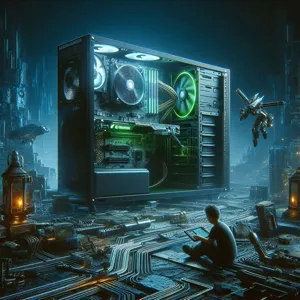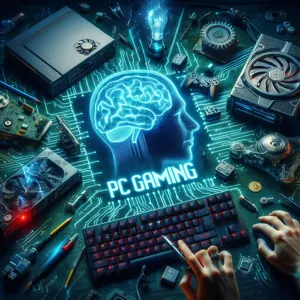As the digital landscape continues to evolve at a breathtaking pace, the world of PC gaming stands at the forefront of innovation, promising exciting possibilities for gamers everywhere.
With advancements in technology, graphics, and gameplay mechanics, the future of PC gaming is not just about enhanced visuals; it’s about immersive experiences that blur the lines between reality and the virtual world. From the rise of cloud gaming and virtual reality to the integration of artificial intelligence and machine learning, the trends shaping this dynamic industry are set to redefine how we play and interact with our favorite games. In this blog post, we’ll explore the cutting-edge innovations that are on the horizon, delve into emerging trends that are transforming the gaming experience, and offer insights into what gamers can expect next in this thrilling journey. Whether you’re a casual player or a hardcore enthusiast, get ready to dive into the future of PC gaming and discover what awaits you in this ever-evolving digital playground.
1. Introduction: The Evolution of PC Gaming

The world of PC gaming has undergone a remarkable transformation since its inception, evolving from rudimentary text-based adventures to breathtaking, immersive experiences that captivate millions. In the early days, gamers were limited to simple graphics and straightforward gameplay, often reliant on imagination to fill in the gaps. However, as technology advanced, so too did the complexity and depth of video games.
Today, we find ourselves in an era where cutting-edge graphics, high-speed internet, and powerful hardware have redefined what is possible in gaming. The introduction of 3D graphics in the 1990s marked a significant turning point, paving the way for sprawling open worlds and intricate storytelling. Titles like “Doom” and “Quake” laid the foundation for first-person shooters, while role-playing games like “Baldur’s Gate” and “Final Fantasy” began to incorporate rich narratives and character development that resonated with players.
As we moved into the 21st century, the rise of online gaming brought a new dimension to the experience. Multiplayer games created communities that transcended geographical boundaries, allowing players to connect and collaborate like never before. The advent of digital distribution platforms such as Steam revolutionized how games were purchased and played, paving the way for indie developers to flourish alongside big-name studios.
Now, in 2023, the landscape is rapidly shifting once again. Innovations like virtual reality (VR) and augmented reality (AR) are pushing the boundaries of immersion, while advancements in artificial intelligence (AI) are enhancing gameplay dynamics and creating more lifelike NPC interactions. Cloud gaming services are making high-quality gaming accessible to a broader audience, regardless of hardware limitations.
As we delve deeper into the future of PC gaming, we will explore the trends and innovations that are shaping the industry, offering insights into what gamers can expect next. From hardware advancements to revolutionary gameplay mechanics, the journey ahead promises to be as exciting as the evolution we’ve witnessed thus far. Buckle up, gamers—this is just the beginning!
2. Current State of PC Gaming: A Snapshot
As we dive into the current state of PC gaming, it’s essential to take a moment to appreciate the vibrant and ever-evolving landscape that has emerged over the past few years. Today, the industry stands as a bustling ecosystem, fueled by technological advancements, a growing community, and an ever-expanding library of games that cater to diverse tastes and preferences.
At the heart of this transformation are the powerful gaming rigs that dominate the market. High-performance components such as GPUs from NVIDIA and AMD have made it possible for gamers to experience stunning graphics and immersive gameplay like never before. With ray tracing technology and support for 4K resolution becoming more commonplace, players are treated to breathtaking visuals that blur the line between reality and the digital world.
Moreover, the rise of digital distribution platforms like Steam, Epic Games Store, and GOG has revolutionized the way gamers access their favorite titles. No longer confined to physical copies, players can now explore vast libraries of games at their fingertips, often benefiting from sales and free-to-play options that encourage experimentation. This shift has also allowed indie developers to thrive, bringing innovative and unique experiences to the forefront of the gaming scene.
The community aspect of PC gaming has never been more robust. Online multiplayer games, esports tournaments, and streaming platforms like Twitch and YouTube Gaming have fostered a sense of camaraderie among gamers, creating spaces for discussion, collaboration, and competition. Social media also plays a crucial role in shaping the gaming community, with platforms like Discord enabling gamers to connect, strategize, and share their experiences in real-time.
Lastly, the current state of PC gaming is marked by a growing emphasis on inclusivity and accessibility. Developers are increasingly recognizing the importance of catering to a wide range of players, including those with disabilities. Innovations such as customizable controls, colorblind modes, and adaptive technologies are becoming standard practices, ensuring that everyone can enjoy the rich tapestry of experiences that PC gaming has to offer.
In this dynamic environment, the future of PC gaming looks bright. Whether you are a casual player or a hardcore enthusiast, the current state of the industry provides a thrilling glimpse into the possibilities that lie ahead. As we explore the trends and innovations shaping the future, it becomes clear that the world of PC gaming is not only about technology and graphics; it’s about community, creativity, and the endless pursuit of fun.
3. Emerging Trends in Game Design

The landscape of game design is evolving at a breathtaking pace, driven by technological advancements and a deeper understanding of player psychology. one of the most notable emerging trends is the integration of artificial intelligence (AI) in game development. This innovation allows for more dynamic and responsive gameplay experiences, where NPCs (non-playable characters) can adapt to players’ actions, learning and evolving along the way. Imagine a game world where enemies devise new strategies based on your gameplay style or where storylines shift and change based on your decisions, creating a uniquely tailored experience for every gamer.
Another significant trend is the rise of immersive storytelling, increasingly facilitated by virtual reality (VR) and augmented reality (AR). Game designers are pushing the boundaries of narrative structure, crafting intricate plots that not only capture players’ imaginations but also allow them to interact with the story in groundbreaking ways. Players may find themselves not just as passive participants but as integral parts of the narrative itself, influencing outcomes based on their choices and interactions.
Additionally, the shift towards inclusivity in game design is gaining momentum. Developers are becoming more attuned to the diverse backgrounds and preferences of gamers, leading to the creation of characters and storylines that resonate on a broader level. This inclusivity not only enriches the gaming experience but also fosters a community where all players feel represented and valued.
Lastly, the increasing importance of community-driven content cannot be overlooked. As platforms like Steam and Epic Games Store allow players to share mods, custom levels, and user-generated content, game design is becoming a collaborative effort. This trend not only extends the life of games but also empowers gamers to contribute creatively, blurring the lines between player and developer.
As we look ahead, the future of game design is not just about more powerful graphics or longer playtimes; it’s about creating richer, more engaging experiences that resonate with players on multiple levels. Gamers can expect a future where innovation is at the forefront, unlocking new realms of creativity and interaction that will redefine what it means to play.
4. Innovations in Hardware: What to Look For
As the landscape of PC gaming continues to evolve, hardware innovations are at the forefront, shaping the experience that gamers can expect in the coming years. The relentless pursuit of enhanced performance and immersive experiences is driving manufacturers to push the boundaries of technology, resulting in a plethora of exciting developments.
One of the most anticipated innovations is the advent of next-generation GPUs. Companies are racing to release graphics cards that not only support higher resolutions and frame rates but also leverage advanced AI capabilities for real-time rendering and improved visual fidelity. These GPUs will enable gamers to experience stunning graphics that blur the lines between reality and the virtual world, offering breathtaking realism in their favorite titles.
Alongside graphics cards, the rise of faster and more efficient storage solutions like NVMe SSDs is transforming load times and performance. With lightning-fast read and write speeds, gamers can expect nearly instantaneous access to their games, allowing for a seamless experience without frustrating delays. This shift toward rapid storage is crucial as game files continue to grow in size and complexity, providing players with a smooth transition from menu to gameplay.
Additionally, the growing trend of modular gaming PCs is gaining traction. This approach allows gamers to customize and upgrade their systems with ease, ensuring that they can keep pace with the latest technological advancements without needing to invest in entirely new setups. Whether it’s swapping out a GPU or adding more RAM, modular designs empower gamers to tailor their rigs to their specific needs and preferences.
Finally, as virtual reality (VR) and augmented reality (AR) technologies mature, we can expect hardware innovations that enhance immersion. Devices like lightweight VR headsets with improved motion tracking and haptic feedback will create a more engaging experience, drawing players deeper into the worlds they inhabit. As these technologies become more accessible and affordable, they will undoubtedly change the way we interact with games.
In summary, the future of PC gaming hardware is bright, filled with innovations that promise to elevate the gaming experience to unprecedented heights. From cutting-edge GPUs and rapid storage solutions to modular designs and immersive VR technologies, gamers have much to look forward to as they prepare to embrace the next generation of gaming.
5. The Rise of Cloud Gaming: Implications for PC Gamers

As we venture deeper into the digital age, one of the most transformative trends on the horizon for PC gaming is the rise of cloud gaming. This innovative approach to gaming is set to redefine how we access, play, and experience our favorite titles, promising both exciting opportunities and potential challenges for PC gamers.
At its core, cloud gaming allows players to stream games directly from powerful remote servers, eliminating the need for high-end hardware to run graphically intensive games. Traditionally, a top-tier gaming PC with cutting-edge graphics cards and ample RAM was essential for a seamless gaming experience. However, with cloud gaming platforms like NVIDIA GeForce NOW, Google Stadia, and Xbox Cloud Gaming, gamers can now access the latest AAA titles from virtually any device—be it a low-spec laptop, tablet, or even smartphones. This democratization of gaming opens the door for a broader audience, as it lowers the barriers to entry, allowing more enthusiasts to join the community without the hefty investment in expensive hardware.
Moreover, the implications of cloud gaming extend beyond accessibility. With games hosted on the cloud, developers can push regular updates and patches without the cumbersome download times that traditionally plague gaming on local machines. This means players can jump straight into gameplay with minimal downtime, experiencing the latest features and fixes instantly. As latency and internet speeds improve, the dream of high-quality, lag-free gaming experiences becomes increasingly attainable, making cloud gaming a viable alternative even for competitive gamers.
However, the rise of cloud gaming is not without its concerns. For many dedicated PC gamers, the idea of relying on an internet connection for gameplay raises questions about control and ownership. What happens if the service goes down, or if a game is removed from the platform? Additionally, gamers who cherish the tactile feedback of a mouse and keyboard setup may find it challenging to adapt to cloud gaming’s potential limitations in input responsiveness, especially in fast-paced genres like first-person shooters or real-time strategy games.
As cloud gaming technology continues to evolve, so too will its impact on the gaming landscape. For PC gamers, embracing this shift could lead to a more interconnected and versatile gaming experience, but it also necessitates a reevaluation of what it means to be a gamer in this new era. With cloud gaming poised to become a significant player in the industry, it’s crucial for enthusiasts to stay informed and adapt to these changes while still cherishing the traditional elements that have defined PC gaming for decades.
6. Virtual Reality and Augmented Reality: The Next Frontier
As technology continues to evolve at a breathtaking pace, virtual reality (VR) and augmented reality (AR) are emerging as the next frontier in PC gaming. While VR immerses players in fully digital environments, allowing them to experience games in a way that feels remarkably real, AR enhances the physical world with digital overlays, providing a unique blend of both realities. Together, these technologies are set to transform not only how we play games but also the overall gaming experience.
Imagine donning a VR headset and stepping into a sprawling fantasy world where you can wield a sword, explore enchanted forests, or engage in epic battles with friends, all from the comfort of your living room. The tactile feedback and immersive audio of advanced VR systems transport you into these realms, making each gaming session feel like an adventure you’ve truly embarked upon. Innovations in motion tracking and haptic feedback are enhancing this experience even further, allowing players to interact with their environments in ways that were once only dreamed of.
On the other hand, AR is changing the landscape by blending the real world with digital elements. Picture yourself playing an interactive puzzle game that projects challenges onto your living room floor or a strategy game where the battlefield is your dining table. Games like Pokémon GO have already demonstrated the appeal of AR, encouraging players to explore their surroundings while engaging with digital content. As AR technology matures, we can expect more complex and engaging experiences that encourage social interaction and community play.
What does this mean for the future of PC gaming? Developers are actively exploring new possibilities and pushing the boundaries of creativity. The growth of VR and AR will likely lead to an expansion of genres, with unique gameplay mechanics that capitalize on the strengths of each technology. As hardware continues to improve, making VR and AR more accessible and affordable, it’s safe to say that these technologies will play a pivotal role in shaping how we experience games.
Gamers can look forward to a future where boundaries between the digital and physical worlds blur, creating opportunities for deeper engagement, collaboration, and innovation. Whether you’re a casual gamer or a hardcore enthusiast, the rise of VR and AR promises to redefine gaming in ways we can only begin to imagine. So, buckle up and prepare for a thrilling journey into the next frontier of PC gaming—it’s going to be an exhilarating ride!
7. AI and Machine Learning in Game Development

As we stand on the cusp of a new era in gaming, the integration of artificial intelligence (AI) and machine learning into game development is reshaping the landscape in ways we could only dream of a decade ago. Gone are the days when NPCs (non-player characters) followed predictable patterns or when game environments felt static and unresponsive. Today, AI is breathing new life into virtual worlds, making them more dynamic, immersive, and responsive to player actions.
One of the most exciting applications of AI in game development is procedural generation, where algorithms create vast, complex worlds that feel unique every time you play. Imagine embarking on an adventure in a game where the terrain, quests, and even the storyline adapt based on your choices and play style. This not only enhances replayability but also allows developers to create expansive universes without the exhaustive need for manual design.
Moreover, machine learning is paving the way for smarter NPCs that can learn from player behavior. These characters no longer rely solely on pre-programmed responses; instead, they adapt their tactics and dialogue based on interactions. This evolution leads to more engaging and lifelike experiences, making every encounter feel fresh and unpredictable.
Another intriguing development is AI-driven game testing. Traditionally, testing a game for bugs and balance issues has been a labor-intensive process. However, AI can automate many aspects of testing, identifying potential issues faster and with greater precision. This not only accelerates the development timeline but also ensures a more polished product upon release.
The future of AI in gaming extends beyond development; it also encompasses personalized gaming experiences. With advancements in data analytics, games can tailor experiences based on individual player preferences, ensuring that each user feels a unique connection to the game. From adaptive difficulty levels to personalized story arcs, the possibilities are endless.
As AI and machine learning continue to evolve, so too will the expectations of gamers. We can look forward to increasingly intelligent virtual environments, richer narratives, and personalized experiences that keep players engaged and coming back for more. In this brave new world of gaming, the boundaries of creativity and technology will blur, ushering in a future where every gaming session is a one-of-a-kind adventure.
8. The Impact of 5G on Online Gaming Experiences
As the gaming landscape continues to evolve, the emergence of 5G technology is set to revolutionize the online gaming experience in ways we can only begin to imagine. With its lightning-fast speeds, ultra-low latency, and the ability to connect a multitude of devices simultaneously, 5G is poised to enhance every aspect of PC gaming, taking it to new heights.
Imagine a world where lag is a thing of the past. With 5G, gamers can expect seamless gameplay, allowing for split-second reactions in competitive scenarios that could mean the difference between victory and defeat. This transformative speed opens up new possibilities for real-time multiplayer experiences, where hundreds of players can engage in battle royale matches without the dreaded lag spikes that have historically plagued online gaming.
Moreover, 5G supports higher data transfer rates, which means that developers can push the boundaries of graphical fidelity and complexity. Games will become more immersive, featuring expansive open worlds, richer environments, and advanced AI that can respond to player actions in real time. The ability to stream high-resolution graphics directly to devices means that even those who do not own high-end gaming rigs can enjoy a premium gaming experience through cloud gaming services.
Additionally, the rise of 5G paves the way for augmented reality (AR) and virtual reality (VR) experiences to flourish. Gamers can expect more intricate and engaging AR overlays in their favorite titles, leading to a blend of the physical and digital worlds that enhances gameplay in innovative ways. For instance, imagine a strategy game where players can see their units positioned in the real world through AR, creating a more hands-on and tactical experience.
As developers begin to harness the full potential of 5G, gamers can look forward to increased accessibility, with gaming experiences becoming more democratized. Whether you’re in a bustling city or a remote location, the ability to connect to a high-speed network will make gaming more inclusive, allowing everyone to join in on the action.
In sum, the impact of 5G on online gaming experiences cannot be understated. It promises to eliminate barriers, enhance gameplay, and redefine how we interact with games and each other. As this technology becomes more widespread, gamers can expect a future filled with thrilling innovations that will change the way they play and connect with their favorite titles.
9. Sustainability in Gaming: Eco-Friendly Innovations
As the gaming industry continues to evolve, sustainability has emerged as a crucial pillar shaping its future. With growing awareness about environmental issues, game developers, hardware manufacturers, and even gamers are beginning to prioritize eco-friendly innovations that reduce the industry’s carbon footprint. This shift towards sustainability is not just a trend; it’s a necessary evolution that reflects a collective responsibility to protect our planet.
One of the most exciting developments in this arena is the rise of energy-efficient gaming hardware. Manufacturers are now focusing on creating components like graphics cards and processors that consume less power while maintaining high performance. For instance, GPUs designed with advanced power management technologies can deliver exceptional gaming experiences without draining resources unnecessarily. This means that gamers can enjoy their favorite titles while contributing to a greener environment.
Moreover, the gaming community is witnessing a surge in the popularity of digital distribution platforms, reducing the need for physical copies of games. This transition not only minimizes waste associated with packaging and shipping but also provides gamers with instant access to a vast library of titles. Coupled with a growing trend of cloud gaming, where games are streamed rather than downloaded, the industry is finding innovative ways to deliver exceptional experiences without the environmental costs linked to traditional gaming models.
In addition to hardware and distribution, game developers are integrating eco-conscious themes into their narratives and gameplay. Titles that explore environmental issues or encourage sustainable practices resonate with players, fostering a sense of awareness and responsibility among the gaming community. Games like *Eco*, where players must collaboratively build and manage an ecosystem, serve as educational tools that highlight the impact of human actions on the environment.
As we look to the future, sustainability in gaming is set to become a defining characteristic of the industry. With players increasingly demanding transparency and eco-friendly practices from their favorite brands, the pressure for change will only intensify. Whether it’s through innovative hardware, responsible game design, or community initiatives, the path towards a more sustainable gaming landscape is not just a possibility; it’s a necessity. Gamers can expect to see these eco-friendly innovations transforming their experience, paving the way for a gaming future that is as responsible as it is entertaining.
10. Cross-Platform Play: A Unifying Trend
Cross-platform play is rapidly emerging as a defining trend in the future of PC gaming, breaking down the walls that once segregated players based on their chosen platforms. Gone are the days when gamers were confined to their specific ecosystems, often missing out on multiplayer experiences due to hardware limitations. Today, developers are increasingly recognizing the benefits of inclusivity, allowing players on PCs, consoles, and even mobile devices to join forces or compete against one another in shared gaming environments.
This unifying trend is driven by both technological advancements and a cultural shift within the gaming community. With powerful cloud computing capabilities and robust server infrastructures, developers can create seamless experiences that connect players regardless of the device they’re using. This not only enhances the social aspect of gaming but also expands the player base for many titles, leading to more dynamic and engaging multiplayer sessions.
For gamers, the implications are profound. Imagine diving into a session of your favorite battle royale game alongside friends who may be on a console while you’re on your high-performance gaming rig. The camaraderie and competition can flourish, making the experience richer and more enjoyable. Furthermore, cross-platform play encourages developers to focus on optimizing gameplay mechanics rather than catering to the limitations of specific hardware, leading to more innovative and polished titles.
As we look to the future, the expectation of cross-platform capabilities will likely shape game development strategies. Titles that embrace this trend are poised to attract larger audiences and foster long-lasting communities. Moreover, as the gaming landscape evolves, we can anticipate not just greater interoperability among devices, but also enhanced support from developers, including regular updates and dedicated servers that prioritize a smooth experience for all players, no matter where they log in from.
In this new era of gaming, where the boundaries between platforms are blurred, players can look forward to a more interconnected and inclusive gaming experience, where the focus is on the game itself and the friendships built along the way. As cross-platform play continues to gain momentum, it will undoubtedly redefine how we interact with games and each other in the vast digital universe.
11. The Importance of Community and Social Features
In the realm of PC gaming, community and social features have evolved from simple chat functions to integral elements that shape the gaming experience. As we look to the future, the importance of fostering community ties within games cannot be overstated. Gamers are no longer isolated players in a virtual world; they are part of vibrant, interactive communities that enhance their overall experience.
Online multiplayer games now incorporate a multitude of social features that allow players to connect, collaborate, and compete with one another. From in-game voice chat and party systems to integrated forums and social media sharing options, these tools create a sense of belonging and camaraderie among players. Future innovations are likely to take this a step further, with developers placing even greater emphasis on community-building elements. Expect to see enhancements like customizable guilds, dynamic matchmaking based on player interests, and robust event systems that bring gamers together for challenges, tournaments, and in-game celebrations.
Moreover, the rise of streaming platforms has opened new avenues for community engagement. Gamers can now share their gameplay experiences in real-time, allowing for immediate interaction with viewers and followers. This trend is set to grow, with more games integrating streaming capabilities directly into their platforms, making it easier for players to showcase their skills and connect with fans.
Additionally, the future will likely see the emergence of virtual reality (VR) and augmented reality (AR) experiences that prioritize social interactions. Imagine stepping into a fully immersive VR world where you can not only play but also meet and interact with friends as if you were in the same physical space. These advancements will transform the way players experience gaming, further blurring the lines between the virtual and real worlds.
As the gaming landscape continues to evolve, developers must recognize the importance of community and social features in creating engaging and lasting experiences. By prioritizing these elements, they can ensure that players feel connected not just to the game, but to each other, ultimately enhancing player loyalty and satisfaction in an increasingly competitive market. Gamers can expect a future where community bonds are stronger than ever, making every victory more meaningful and every challenge more rewarding.
12. Future-Proofing Your Gaming Setup
As technology continues to evolve at a breakneck pace, future-proofing your gaming setup is essential for staying ahead of the curve. Gamers today are not just investing in hardware; they’re investing in a vision of what their gaming experience could look like in the years to come. This means making strategic choices that will keep your rig relevant and powerful, even as new advancements roll out.
start by considering modular components that can be easily upgraded. For instance, opting for a motherboard that supports the latest CPUs and GPUs will give you the flexibility to swap out older parts without needing to overhaul your entire system. Additionally, investing in a high-quality power supply with ample wattage can accommodate future upgrades without the risk of power shortages or hardware failures.
Next, think about your storage solutions. Solid-state drives (SSDs) are becoming the norm, but not all SSDs are created equal. Look for NVMe drives that offer superior speed and durability. These drives not only load games faster but also provide the necessary space for larger titles and updates, ensuring you won’t have to compromise on performance as games become more demanding.
Don’t forget about peripherals, either! Gaming mice, keyboards, and headsets are constantly evolving, and choosing customizable options can enhance your gameplay and help you adapt to new genres or gameplay mechanics. Ergonomics should also be top of mind; investing in a comfortable gaming chair or desk can significantly enhance your gaming sessions, allowing you to play longer without discomfort.
Lastly, keep an eye on emerging technologies, such as virtual reality (VR) and augmented reality (AR). As these technologies mature, they will undoubtedly become a staple in the gaming community, and being prepared for them can set your gaming setup apart. Whether it’s ensuring your graphics card can handle VR rendering or having the necessary space for a VR setup, being proactive about these innovations will keep your gaming experience cutting-edge.
In conclusion, future-proofing your gaming setup isn’t just about buying the latest gear; it’s about making informed decisions that keep you adaptable in an ever-evolving landscape. By investing wisely and staying aware of trends, you can ensure your gaming rig remains a powerhouse for years to come.
13. Expectations for Game Releases in the Next Few Years
As we peer into the crystal ball of PC gaming, the expectations for game releases over the next few years are nothing short of exhilarating. With advancements in technology and a rapidly evolving gaming landscape, players can anticipate a wave of innovative titles that push the boundaries of storytelling, graphics, and interactivity.
First and foremost, the rise of cloud gaming is set to revolutionize how games are accessed and played. Services like NVIDIA GeForce NOW and Google Stadia have already begun to demonstrate the potential of streaming high-quality games without the need for powerful hardware. In the coming years, gamers can expect a broader array of titles to be available on these platforms, making gaming more accessible to a wider audience. This shift will not only change the way we buy and play games but will also lead developers to create experiences that are optimized for streaming, emphasizing quick gameplay sessions and social connectivity.
Moreover, the integration of artificial intelligence (AI) is poised to redefine game design. From more sophisticated NPC behaviors to dynamic storytelling that reacts to player choices in real-time, AI will enable developers to create richer, more immersive worlds. Imagine a game where the narrative shifts based on your decisions, where characters remember your past actions and adapt their responses accordingly. This level of depth will deepen player engagement and create experiences that feel personal and tailored.
Meanwhile, the trend of immersive technologies—such as virtual reality (VR) and augmented reality (AR)—is expected to gain further traction. As hardware becomes more affordable and user-friendly, developers are likely to explore new ways to incorporate these technologies into their titles. Gamers can look forward to compelling VR experiences that transport them into fantastical realms, as well as AR games that blend the digital and physical worlds, creating unique interactions in everyday settings.
In terms of genres, the next few years are likely to witness a resurgence of narrative-driven games, as players seek emotional connections and meaningful experiences. Indie developers are thriving, often pushing the boundaries of creativity and storytelling where traditional studios may hesitate. This trend will encourage larger publishers to take more risks and invest in innovative, story-rich titles that captivate audiences in ways that are both familiar and refreshingly new.
Lastly, with the ongoing conversation surrounding inclusivity and diversity in gaming, expect to see a broader representation of characters, stories, and perspectives in upcoming releases. Developers are increasingly recognizing the importance of reflecting our diverse world, creating games that resonate with a myriad of players.
In summary, the future of PC gaming promises an exciting array of innovations and trends that will redefine how we play and experience games. With cloud gaming, AI advancements, immersive technologies, a focus on narrative, and a commitment to diversity, the next few years are sure to be groundbreaking, making it an exhilarating time to be a gamer.
14. The Role of Indie Developers in the Future Landscape
As the gaming industry continues to evolve, indie developers are poised to play a pivotal role in shaping the future landscape of PC gaming. These small, independent studios are often the driving force behind some of the most innovative and creative titles on the market. With fewer resources than their larger counterparts, indie developers frequently rely on their ingenuity and passion to craft unique gaming experiences that resonate deeply with players.
One of the most significant trends we’re witnessing is the rise of diverse narratives and gameplay mechanics that challenge conventional gaming norms. Indie developers have the freedom to experiment with storytelling, art styles, and game mechanics without the constraints typically imposed by major publishers. This has led to a surge in games that tackle complex themes—ranging from mental health to social justice—encouraging players to engage with content on a more personal level.
Additionally, the advancement of technology has leveled the playing field, allowing indie developers to access powerful game engines like Unity and Unreal Engine at a fraction of the cost. This democratization of game development means that more creators can bring their visions to life, resulting in a rich tapestry of games that cater to an array of tastes and preferences. From pixel art platformers to immersive narrative adventures, the variety is expansive and captivating.
The growth of digital distribution platforms such as Steam, itch.io, and the Epic Games Store has also facilitated the rise of indie games, allowing developers to reach a global audience without the need for traditional retail channels. These platforms often feature curated sections that spotlight indie titles, making it easier for players to discover hidden gems that might otherwise go unnoticed in a sea of blockbuster releases.
Looking ahead, the collaboration between indie developers and established gaming studios is likely to flourish. Many larger companies are recognizing the value of fresh perspectives and innovative ideas that indie developers bring to the table. This synergy can lead to unique partnerships, where indie titles benefit from the marketing and distribution power of larger studios, while major publishers gain access to fresh, creative content that can invigorate their portfolios.
In conclusion, indie developers are not just a side note in the PC gaming narrative; they are pivotal to its future. As they continue to push boundaries and challenge the status quo, gamers can expect a vibrant, diverse gaming landscape that emphasizes creativity, innovation, and storytelling. The indie scene is thriving, and its influence on the future of PC gaming cannot be overstated—players should keep a keen eye on this dynamic sector as it evolves and flourishes in the coming years.
15. Conclusion: Preparing for the Next Era of PC Gaming
As we stand on the precipice of a new era in PC gaming, it’s clear that innovation is driving the industry forward at an unprecedented pace. The trends we’ve explored—from the rise of cloud gaming and the integration of AI to the increasing popularity of virtual reality—are not just fleeting fads; they signal a profound transformation in how we engage with games. Gamers can expect to see more immersive experiences that blur the lines between reality and the gaming world, with cutting-edge technologies paving the way for rich storytelling and interactive gameplay.
In preparing for this next chapter, gamers should stay informed and adaptable. Embracing new technologies, whether it’s upgrading hardware to support high-fidelity graphics or experimenting with emerging platforms, will be crucial. Building a community through forums and social media can also enhance the gaming experience, allowing players to share insights and strategies as they navigate the evolving landscape.
Moreover, as developers continue to push boundaries, players have the power to influence the direction of gaming through feedback and engagement. By thoughtfully participating in beta tests or providing constructive criticism, gamers can help shape the future of their favorite titles.
Ultimately, the future of PC gaming is not just about technological advancements; it’s about enhancing the way we connect, compete, and create within virtual spaces. By preparing for the innovations on the horizon and remaining engaged with the community, gamers can ensure they remain at the forefront of this exciting evolution, ready to embrace the new adventures that await.
As we look ahead to the future of PC gaming, it’s clear that innovation is at the forefront of this vibrant industry. From advanced graphics and immersive virtual reality experiences to the rise of cloud gaming and AI-driven technologies, the potential for transformation is staggering. We hope this exploration of emerging trends has inspired you to embrace the exciting developments on the horizon and consider how they might enhance your own gaming experiences. Whether you’re a casual gamer or a hardcore enthusiast, staying informed about these advancements will not only keep you ahead of the curve but also ensure you’re fully equipped to enjoy the next generation of gaming. So gear up, stay curious, and get ready to dive into a future filled with endless possibilities in the realm of PC gaming!






